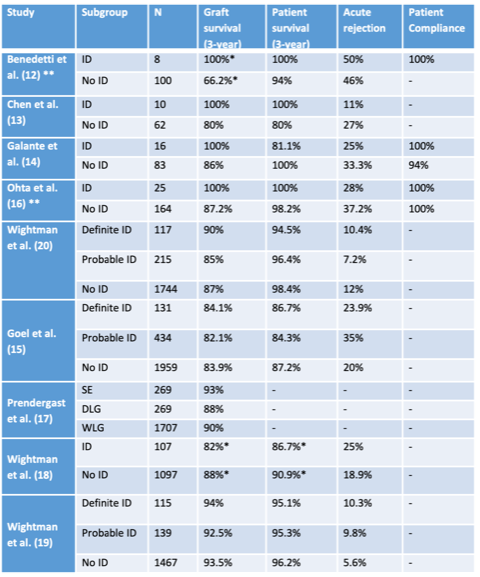Outcome of Solid Organ Transplantation in Candidates with Intellectual Disability: A Systematic Review
L. Orlandini
Erasmus MC, Rotterdam, Netherlands
Meeting: 2022 American Transplant Congress
Abstract number: 1592
Keywords: Heart, Kidney, Liver, Survival
Topic: Clinical Science » Ethics » 23 - Non-Organ Specific: Economics & Ethics
Session Information
Session Name: Psychosocial and Treatment Adherence
Session Type: Poster Abstract
Date: Tuesday, June 7, 2022
Session Time: 7:00pm-8:00pm
 Presentation Time: 7:00pm-8:00pm
Presentation Time: 7:00pm-8:00pm
Location: Hynes Halls C & D
*Purpose: The allocation of organs comes with an ethical discussion in patients with intellectual disability. Historically, intellectual disability was considered a relative contra-indication for organ transplantation, due to concerns for impaired compliance, survival, and quality of life benefit. This systematic review aims to clarify potential differences in outcomes after organ transplantation in patients with intellectual disability compared to patients without intellectual disability to assess whether these reservations are justified.
*Methods: The databases of Embase; Medline Ovid; PsycINFO; Web of Science; Cochrane Central Register of Trials; and Google Scholar were searched on studies including pediatric or adult solid organ transplantation recipients with pre-transplantation diagnosed intellectual disability. Primary outcomes were patient and graft survival rate and acute rejection rate. Secondary outcomes were the definition and assessment of intellectual disability, patient selection, patient compliance and quality of life. Data was summarized qualitatively.
*Results: Nine studies were included; describing kidney (n=5), heart (n=3) and liver (n=1) transplantation. Patients with intellectual disability were in most cases only considered for transplantation when a sufficient support network was present. In this selection of patients, no study reported substantial problems with treatment compliance or the occurrence of acute rejection. Moreover, reported survival rates were non-inferior compared to patients without intellectual disability. Quality of life was only considered in a minority of patients but showed an improvement in nearly all assessed patients.
*Conclusions: Based on current evidence no solid grounds exist to consider intellectual disability a relative contra-indication for transplantation. Although negative outcomes in present literature may be mitigated by selection of patient with sufficient support, this likewise suggests that transplantation may be performed safely by ensuring adequate safeguarding.
To cite this abstract in AMA style:
Orlandini L. Outcome of Solid Organ Transplantation in Candidates with Intellectual Disability: A Systematic Review [abstract]. Am J Transplant. 2022; 22 (suppl 3). https://atcmeetingabstracts.com/abstract/outcome-of-solid-organ-transplantation-in-candidates-with-intellectual-disability-a-systematic-review/. Accessed July 9, 2025.« Back to 2022 American Transplant Congress

